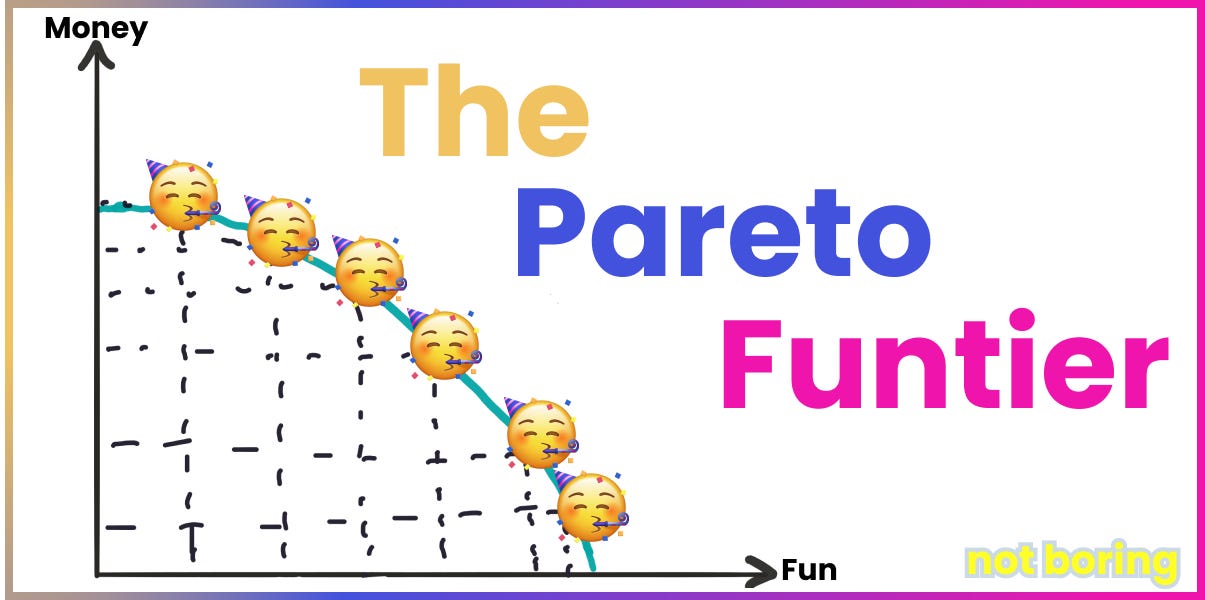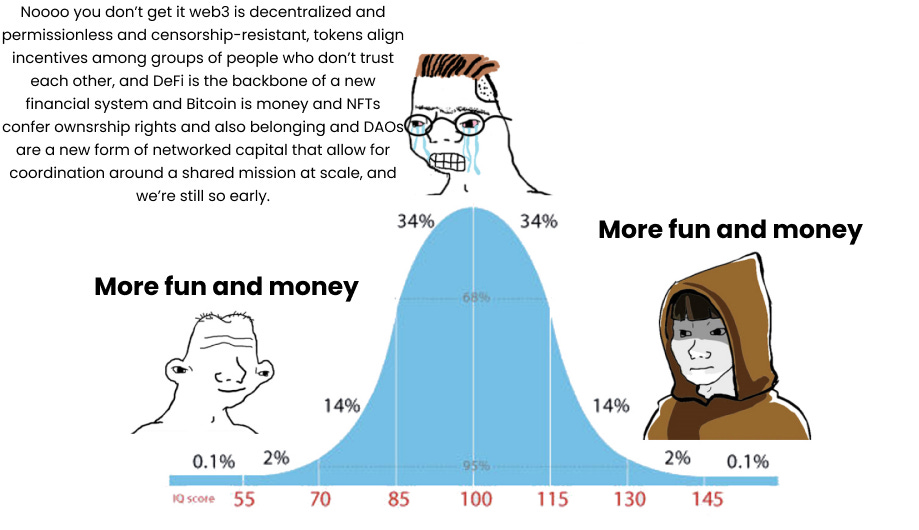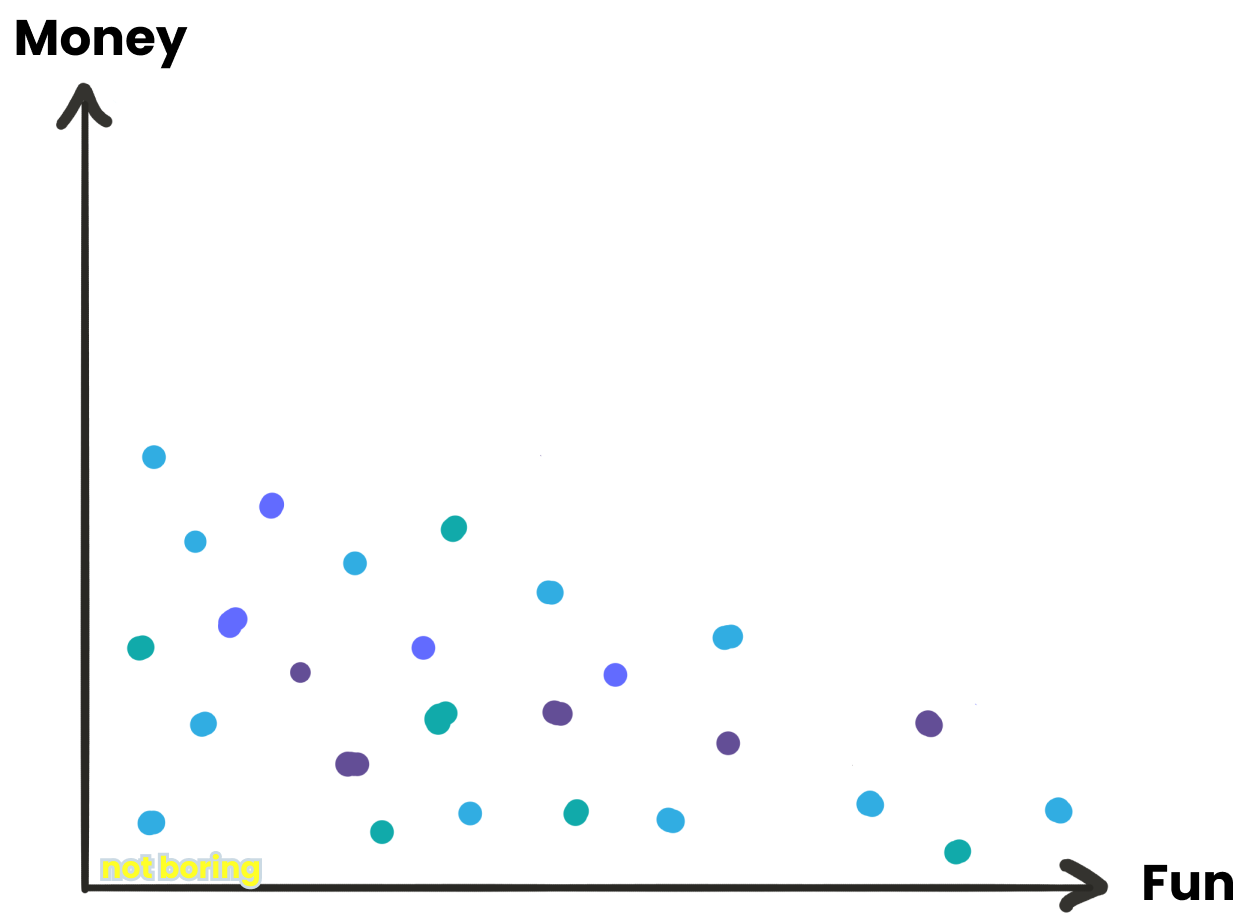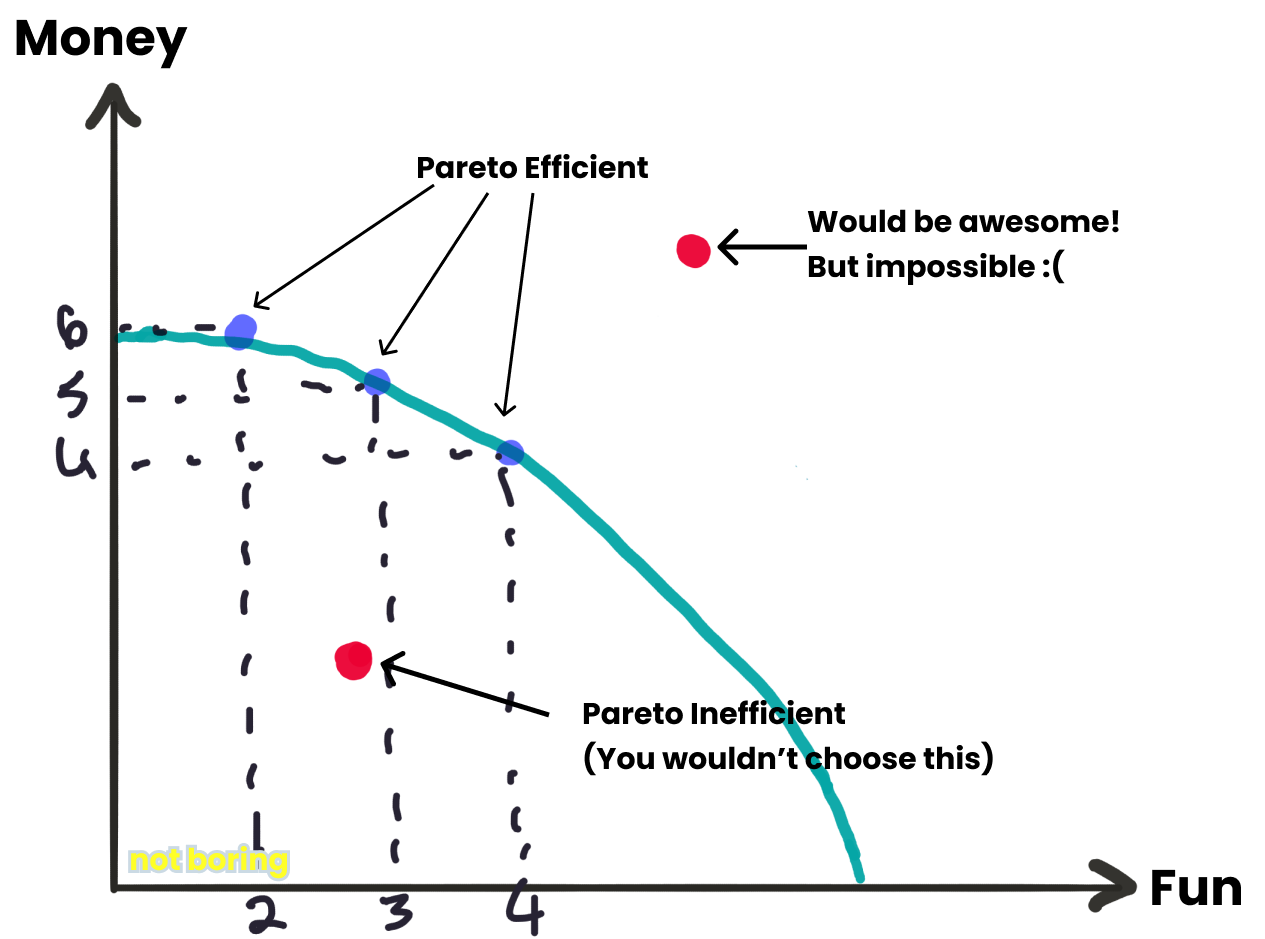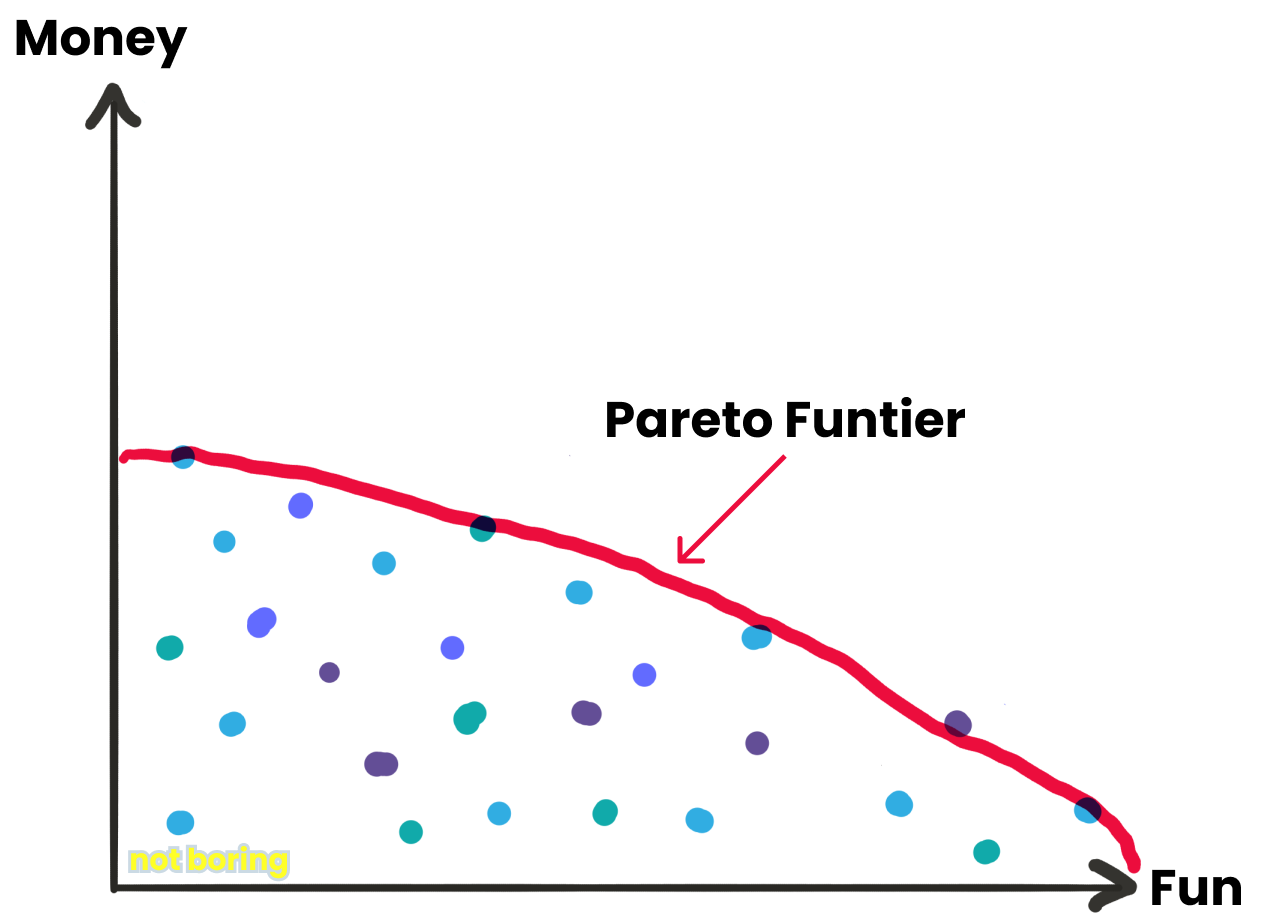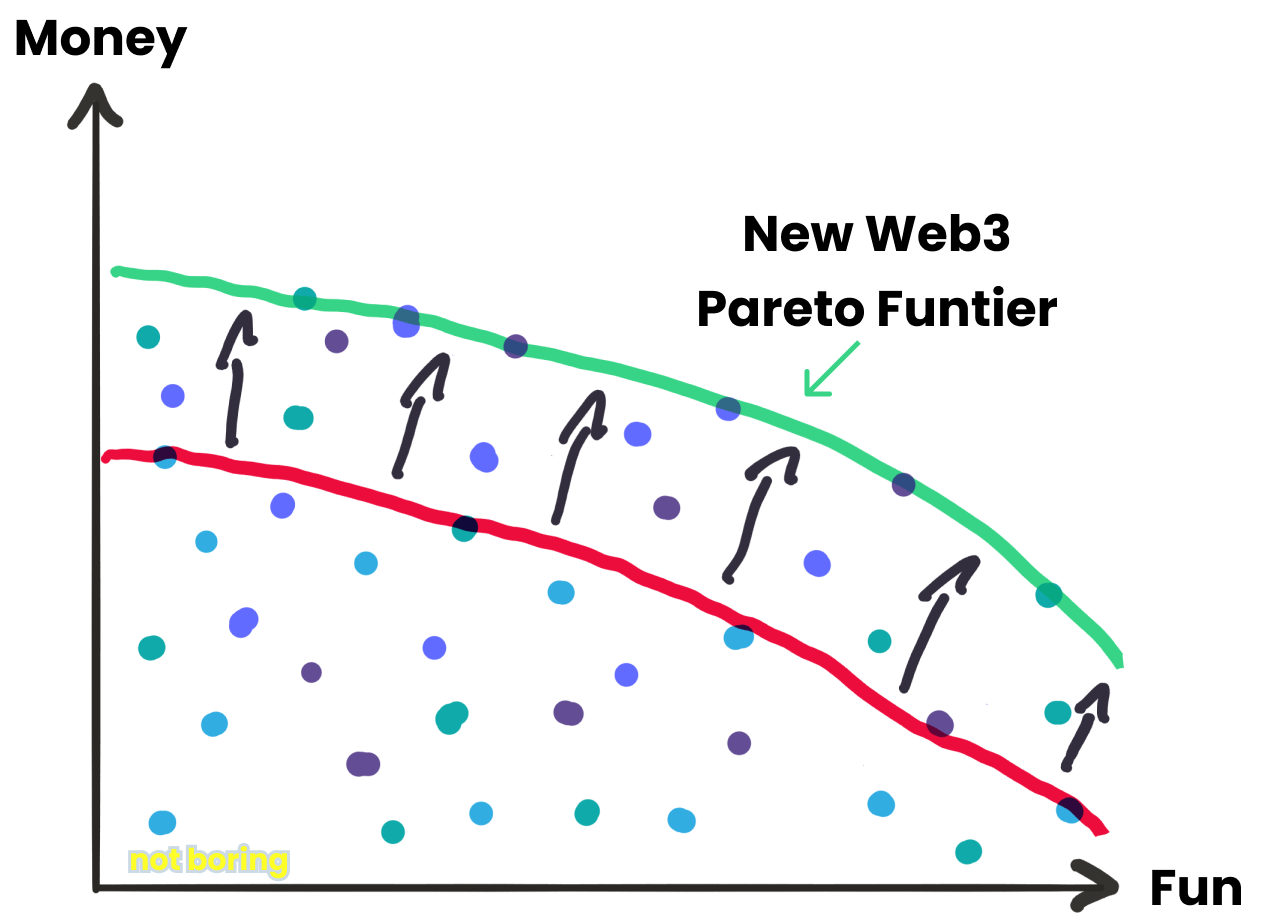Not Boring by Packy McCormick - The Pareto Funtier
Welcome to the 2,843 newly Not Boring people who have joined us since the Monday before Thanksgiving! Join 90,930 smart, curious folks by subscribing here: 🎧 To get this essay straight in your ears: listen on Spotify or Apple Podcasts (shortly) Today’s Not Boring is brought to you by… Mosaic I’m excited to introduce you to a new sponsor today, just in time for year-end close and 2022 strategic planning: Mosaic. Your company’s data lives across a million acronyms — ERP, CRM, HRIS, and billing. Mosaic pulls it all together in one place to empower your team to make better decisions, faster. As the first Strategic Finance Platform, Mosaic breaks the cycle of backward-looking reporting by giving your team instant insights across the metrics that matter most to your organization. With Mosaic, you can connect your data in seconds, model scenarios in minutes, and report in real-time. That’s why finance teams at today’s fastest-growing companies, like Fivetran, Gem, Canvas, and Sourcegraph, turn to Mosaic for agile planning, real-time reporting, and better decision making. To see Mosaic in action and learn about special pricing for Not Boring subscribers: Hi friends 👋, Happy Monday! I hope everyone had a great Thanksgiving, thanks for letting me have some time off. Y’all are the best bosses. But just because I wasn’t writing doesn’t mean there was no Not Boring content. On Friday, my friends Ben and David at Acquired dropped a 2 hour 45 minute episode on Not Boring itself!
I am a massive Acquired fan. My brother Dan and I have been for a long time. A lot of their episodes have been foundational to the things I’ve written here. It was surreal to get to go on the pod and to have them give Not Boring the full Acquired treatment. Give it a listen, and if you don’t already, subscribe wherever you listen to podcasts. I’d wager that if you like Not Boring, there’s no way you won’t love Acquired. That was a lot of fun. Speaking of which… Let’s get to it. The Pareto FuntierWeb3 is a vortex for talent, money, culture, and brainspace. I’ve been trying to figure out why, and explain it in the simplest terms. I think I have it, my tailwit explanation: Web3 pushes out the Pareto Funtier. Most of the decisions we make can be boiled down to fun and money. Granted, that’s a gross oversimplification. I’m using “fun” as a catch-all for a whole lot of things like love, meaning, belonging, enjoyment, challenge, and more, and “money” as some sort of net present value (NPV) of resources acquired as a result of your decisions. In my loose definition, going to church might count as fun because it gives you meaning, or studying might count as money because it increases your chances of making more money later. Studying might also be fun if you enjoy it and derive pleasure from the sense of challenge and accomplishment. But the point here is to keep things simple, so we’ll go with those two variables: fun and money. Let’s do some examples, using a 1-10 scale.
We’re glossing over nuance on the specifics here, too. A really expensive art museum with a terrible collection might be a 3 on fun and -1 on money. An online course that you’re taking purely to learn about something that fascinates you might be a 9 on fun and a 0 on money. A fast-growing startup with an electric culture solving a problem you want to solve might be an 8 on fun and a 9 on money. Each example is also subject to each person’s preferences and situation. Reading sci-fi might be higher on the fun and money scale for me because on the fun side, I’m a nerd, and on the money side, maybe it sparks an idea that helps me write something great. Some people genuinely enjoy working in investment banking. And each person has his or her own opportunity set – that energetic, important, fast-growing startup might only hire people who are in the top 0.1% of people in their respective professions. Every decision overlaps, intersects, and influences the others. Maybe you choose to work in investment banking, sacrificing fun for money at work, because you really want to live in a nice place today or because you want to retire early and do only fun things thereafter. And finally, that stone in the shoe of economists: humans aren’t as rational as the textbooks would suggest. People often choose to do things that aren’t particularly fun or financially fruitful. Humans gonna human. But assuming that we’ve baked everything in correctly, and accounted for and discounted the future implications of our current decisions, for the sake of this thought exercise, we can say that humans make decisions in such a way that maximizes fun and money. You wouldn’t choose a job that’s a 2 on fun and a 3 on money when a job that’s a 3 on fun and a 5 on money is available to you. You could, however, choose among options that add up to the same total from different angles. Jobs that are 2 on fun and 6 on money, 3 on fun and 5 on money, and 4 on both fun and money might be equally attractive. These equal choices are Pareto efficient. Pareto efficiency is “a situation where no individual or preference criterion can be better off without making at least one individual or preference criterion worse off or without any loss thereof.” In our example, you couldn’t get a job that’s 1 point more fun without giving up 1 point of money. The Pareto frontier is the set of all Pareto efficient situations, it’s all the trade-offs that you might rationally be willing to make. We’re going to use Pareto Funtier here for a couple of reasons:
Anyway, in our case, the Pareto Funtier is the set of options at which you can’t have more fun without making less money or can’t make more money without having less fun. Given the existing options, it’s up to participants to choose among options on the funtier based on their preferences, but economically speaking, they’re all fair trade-offs. If you want to make more money, you’ll have to give up a little fun. If you want to have more fun, you’ll need to give up a little money. Which brings us back to why web3 is so attractive to so many, why once you go down the rabbit hole, it’s practically impossible to come out. There are a lot of reasons – technological, financial, psychological, emotional, and more – that more and more people have been drawn to web3, but I think the simplest is this: Web3 pushes the Pareto Funtier outwards by baking money into fun things and fun into money things. The people who argue that web3 is just a fad, or downright bullshit, by saying that the user experience isn’t good or that there aren’t any “real use cases” aren’t 100% wrong, they’re just missing the forest for the trees. For early adopters, the user experience and use cases are good enough. Early adopters might be drawn to particular web3 projects because they’re a more fun way to make money than their job, or because they get to earn money by doing things that they find fun anyway. As web3 grows, more use cases emerge that are appealing to more people on one or both dimensions. The most straightforward example here is the play-to-earn gaming movement kicked off by Axie Infinity. Axie is neither the most fun game in the world nor the highest-paying job in the world, but it was able to attract over a million players because it offered more money than the games they were used to playing, and more fun (and often money) than the other jobs available to them. If players’ old games were 7 on fun and 1 on money, and their old jobs were 2 on fun and 4 on money, Axie’s 5 on fun and 6 on money pushed the funtier out. Web3 gaming isn’t finished here. The space will evolve along those two dimensions: fun and money. New games, and improvements from Axie itself, will focus on both tokenomic designs that make players more money and game designs that make the games more fun to play. In The Financialization of Fun, Mechanism Capital’s Eva Wu wrote that she sees two major categories emerging:
But if you’ve been reading Not Boring, you know that many of us are playing the Great Online Game, an infinite game playing out across the internet with crypto as the in-game currency. Work, creativity, investing, education, and nearly every aspect of our digital lives are undergoing the same transformation that’s happening in video games: the financialization of fun, and the funancialization of finance. Depending on who you are, what you care about, and what you do, that will mean different things. Take NFTs. If you’re an artist, NFTs are a way to make more money from the thing you find fun (and a new medium with which to have fun). Over the weekend, Murat Pak completed the largest primary sale by a living artist in history when he sold 266,855 pieces for between $400 and $525 each for a total of at least $106 million:  Merge is both art and a game. Each time a wallet holds two mass NFTs, they “merge” into one thanks to a custom-designed Manifold smart contract. Each time you buy, your new mass gets subsumed into your larger one. The name of the game is to get more mass, and theoretically, the longer you wait to sell to a whale with more mass, the more your mass is worth to them. All to say, if you’re an investor or collector who’s into this sort of thing, this is a much more fun way to try to make money than you’re probably used to. The same might be true for investing in any NFT project and community that resonates with you, from Punks to Apes to ArtBlocks to Wanderers to Aku. For examples from NFTs and DAOs, a little bit on the Experience Economy, and how to push out your Pareto Funtier…How did you like this week’s Not Boring? Your feedback helps me make this great. Loved | Great | Good | Meh | Bad Thanks for reading and see you on Thursday, Packy If you liked this post from Not Boring by Packy McCormick, why not share it? |
Older messages
Idea Legos
Monday, November 22, 2021
Ideas compound and compose just like interest and software
Stytch: Kill the Password
Thursday, November 18, 2021
Announcing the Newest API-First Unicorn Saving the Internet
Let's Buy the US Constitution
Monday, November 15, 2021
ConstitutionDAO, web3, and America
Modern Treasury: The Quadrillion $ Quest
Thursday, November 11, 2021
The $2 billion, 3-year-old Startup Modernizing Money Movement
Discord: Imagine a Place
Monday, November 8, 2021
A Not Boring x The Generalist Collab on the Internet's New Home
You Might Also Like
🔮 $320B investments by Meta, Amazon, & Google!
Friday, February 14, 2025
🧠 AI is exploding already!
✍🏼 Why founders are using Playbookz
Friday, February 14, 2025
Busy founders are using Playbookz build ultra profitable personal brands
Is AI going to help or hurt your SEO?
Friday, February 14, 2025
Everyone is talking about how AI is changing SEO, but what you should be asking is how you can change your SEO game with AI. Join me and my team on Tuesday, February 18, for a live webinar where we
Our marketing playbook revealed
Friday, February 14, 2025
Today's Guide to the Marketing Jungle from Social Media Examiner... Presented by social-media-marketing-world-logo It's National Cribbage Day, Reader... Don't get skunked! In today's
Connect one-on-one with programmatic marketing leaders
Friday, February 14, 2025
Enhanced networking at Digiday events
Outsmart Your SaaS Competitors with These SEO Strategies 🚀
Friday, February 14, 2025
SEO Tip #76
Temu and Shein's Dominance Is Over [Roundup]
Friday, February 14, 2025
Hey Reader, Is the removal of the de minimis threshold a win for e-commerce sellers? With Chinese marketplaces like Shein and Temu taking advantage of this threshold, does the removal mean consumers
"Agencies are dying."
Friday, February 14, 2025
What this means for your agency and how to navigate the shift ͏ ͏ ͏ ͏ ͏ ͏ ͏ ͏ ͏ ͏ ͏ ͏ ͏ ͏ ͏ ͏ ͏ ͏ ͏ ͏ ͏ ͏ ͏ ͏ ͏ ͏ ͏ ͏ ͏ ͏ ͏ ͏ ͏ ͏ ͏ ͏ ͏ ͏ ͏ ͏ ͏ ͏ ͏ ͏ ͏ ͏
Is GEO replacing SEO?
Friday, February 14, 2025
Generative Engine Optimization (GEO) is here, and Search Engine Optimization (SEO) is under threat. But what is GEO? What does it involve? And what is in store for businesses that rely on SEO to drive
🌁#87: Why DeepResearch Should Be Your New Hire
Friday, February 14, 2025
– this new agent from OpenAI is mind blowing and – I can't believe I say that – worth $200/month


